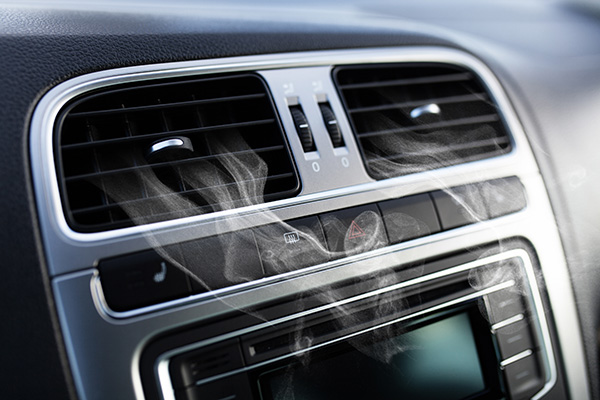
If your car smells like exhaust inside the cabin or you’ve been feeling dizzy, tired, or nauseous after driving, don’t ignore it—a leaking exhaust can absolutely make you sick. Exhaust fumes contain gases like carbon monoxide that are dangerous to breathe, especially in enclosed spaces like your vehicle.
Even small exhaust leaks can lead to big problems if they allow fumes to enter the cabin. It’s not just about noise or emissions—it’s a real safety issue that needs immediate attention.
How Exhaust Leaks Let Fumes Inside the Car
Your exhaust system is designed to move harmful gases away from the engine and out the back of the vehicle. It’s made up of several parts, including the exhaust manifold, catalytic converter, muffler, and piping that routes everything underneath the car.
If there’s a crack, hole, or loose connection anywhere in that system—especially before the muffler or near the firewall—those gases can seep into the passenger area through vents, seams, or even the floorboards.
This is more likely to happen when:
- The vehicle is idling
- Windows are closed
- The HVAC system is pulling air from outside
- You’re in a garage or confined space
What’s in Exhaust Fumes That Makes Them Dangerous
The most serious concern is carbon monoxide (CO)—a colorless, odorless gas that can cause headaches, dizziness, confusion, and even unconsciousness with prolonged exposure.
Other gases, like nitrogen oxides and hydrocarbons, can irritate your lungs, eyes, and throat. While short-term exposure may only cause mild symptoms, continued inhalation of exhaust fumes can have long-term health effects—especially for children, elderly passengers, or those with respiratory issues.
If you’ve noticed feeling unwell in the car but better once you’re outside, that’s a strong indicator that exhaust fumes could be the cause.
Signs Your Car Have an Exhaust Leak
A leak isn’t always obvious at first. Some of the early signs include:
- A strong or unusual smell while driving or idling
- Ticking or hissing sounds from the engine bay
- A louder exhaust tone than usual
- Decreased fuel efficiency
- Unexplained fatigue or headaches during or after drives
The leak could be coming from a rusted exhaust pipe, a cracked manifold, or a failing gasket. In areas like Westchester, CA, where sea air and road conditions can speed up corrosion, these issues are fairly common—especially on older vehicles or those with a lot of mileage.
Why DIY Fixes Won’t Cut It
There are temporary products like exhaust tape or sealant, but they’re just that—temporary. They won’t stop toxic fumes from entering the cabin for long, and in some cases, they can make the problem harder to find later.
A professional inspection is the only safe option. We can perform a smoke test or use exhaust gas analyzers to locate leaks precisely and determine if other parts—like oxygen sensors or the catalytic converter—are also affected.
Depending on the location of the leak, repairs involve welding, replacing a section of pipe, or installing a new manifold or gasket. Once the system is sealed again, your car will be quieter, more efficient, and, most importantly, safer to drive.
Don’t Ignore Exhaust Odors—Act Quickly
Even if the smell comes and goes, don’t brush it off. Exhaust fumes leaking into your cabin can cause symptoms slowly over time—and because carbon monoxide is odorless, you may not realize how much you’ve been exposed until it’s too late.
If you’re unsure whether your vehicle has a leak, getting it checked out quickly can protect your health, your passengers, and your engine.
Don’t take chances with exhaust fumes. Visit Loyola Marina Auto Care in Westchester, CA, for a trusted service that puts your safety first.